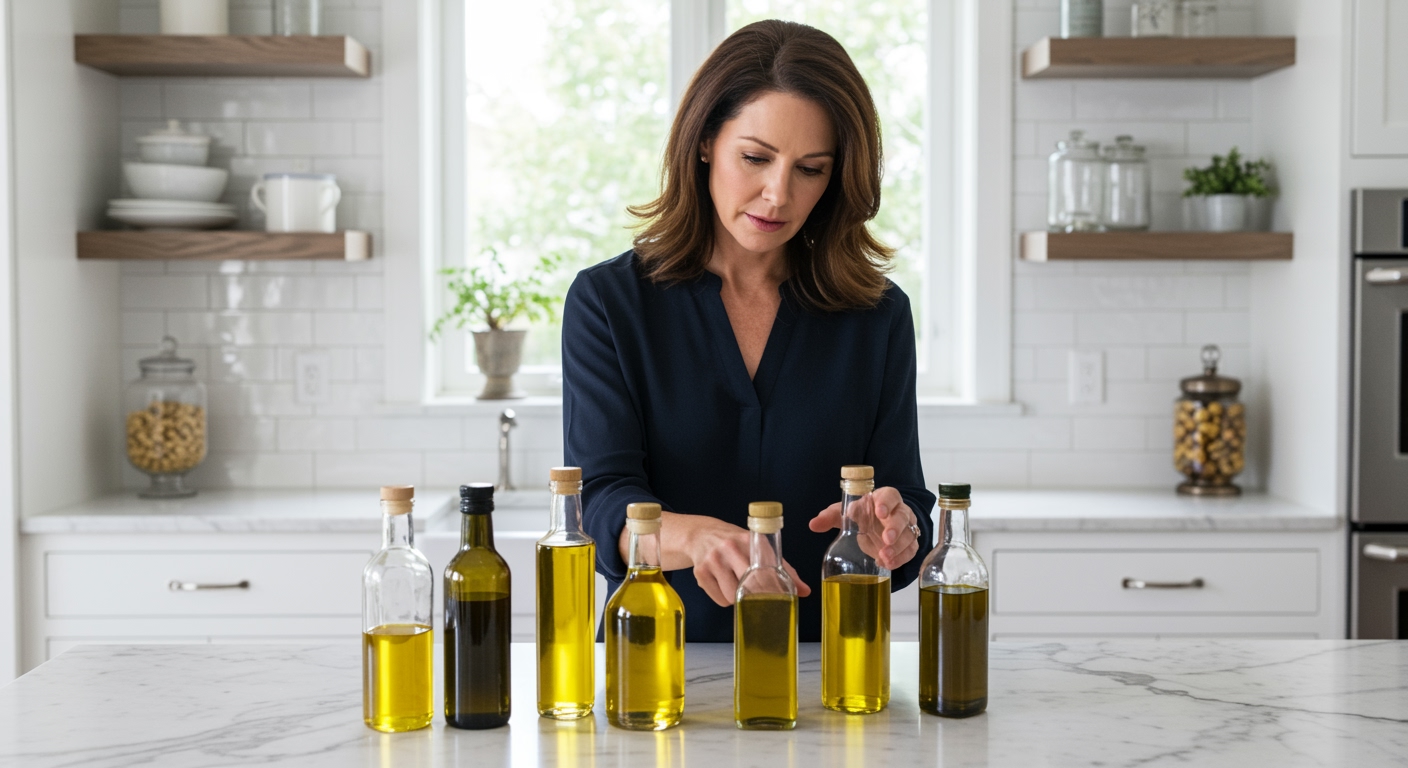✪ Key Highlight: Stanford experts debunk internet claims about dangerous seed oils, revealing omega-6 fats actually create anti-inflammatory molecules.
Introduction
The internet exploded with warnings about the “Hateful 8” seed oils that supposedly destroy your health.
Social media influencers claim these common cooking oils cause chronic inflammation and serious diseases.
Hi, I’m Abdur, your nutrition coach and today I’m going to analyze the latest research that challenges these viral claims about seed oil safety.
What Are The Hateful 8 Seed Oils?
The “Hateful 8” includes canola, corn, cottonseed, grapeseed, soy, rice bran, sunflower, and safflower oil.
These oils contain high amounts of omega-6 fatty acids that your body needs for proper function.
Critics argue that excessive omega-6 consumption creates an inflammatory imbalance in your body.
This theory suggests that modern diets contain too much omega-6 and not enough omega-3 fatty acids.
The supposed imbalance allegedly triggers chronic inflammation that leads to heart disease and cancer.
✪ Fact: Your body cannot produce omega-6 fatty acids on its own, making them essential nutrients you must get from food.
Why Do Studies Show Conflicting Results?
Many studies linking omega-6 fats to health problems rely on self-reported data from participants.
People often forget what they ate or provide inaccurate information about their diets.
This type of data collection creates unreliable results that can mislead researchers and the public.
Controlled trials provide much more accurate information because researchers directly monitor what participants eat.
These controlled studies show that omega-6 fats actually create anti-inflammatory molecules called lipoxins.
Professor Dariush Mozaffarian from Tufts University explains that these molecules have powerful anti-inflammatory effects in your body.
✪ Pro Tip: Always look for controlled studies rather than observational research when evaluating nutrition claims.
What Does The WHO Research Actually Say?
The World Health Organization conducted a comprehensive study in 2022 examining omega-6 consumption and health outcomes.
They found that higher omega-6 to omega-3 ratios might increase risks of cognitive decline and inflammatory bowel disease.
However, the same study revealed that high omega-6 consumption from seed oils was not likely to increase death risk.
The research also showed no significant increase in chronic disease risk from seed oil consumption.
The WHO researchers emphasized that more studies are needed to draw definitive conclusions.
This balanced approach shows that the science is still evolving and not as clear-cut as internet claims suggest.
✪ Note: WHO studies typically involve thousands of participants across multiple countries, making them highly reliable.
Should You Focus On Omega-3 Instead?
Experts recommend increasing omega-3 intake rather than avoiding omega-6 fats completely.
Research shows that higher omega-3 to omega-6 ratios reduce depression risk by 26 percent.
Omega-3 fatty acids appear to balance out any potential negative effects from omega-6 consumption.
You can find omega-3s in fatty fish like salmon, sardines, and mackerel that you should eat twice weekly.
Plant sources include flaxseeds, chia seeds, and walnuts that provide alpha-linolenic acid (ALA).
This approach focuses on adding beneficial nutrients rather than restricting entire food groups unnecessarily.
✪ Pro Tip: Aim for at least two servings of fatty fish per week to optimize your omega-3 intake naturally.
Is Algae Oil A Better Alternative?
Algae oil emerges as a new cooking oil option made from ocean microalgae plants.
This sustainable oil requires no pesticides and has a high omega-3 content that appeals to health-conscious consumers.
However, algae oil costs significantly more than traditional seed oils available in most grocery stores.
The omega-3 levels vary dramatically between different brands, making label reading essential.
Some people experience digestive problems when using large amounts of algae oil in cooking.
People taking blood-thinning medications should consult doctors before using algae oil because omega-3s affect blood clotting.
Limited long-term research means we don’t fully understand algae oil’s safety profile yet.
✪ Fact: Algae oil production uses 90% less land and water compared to traditional oil crops.
The Bottom Line
Stanford University experts confirm that seed oils are not the health demons that internet influencers claim them to be.
Fear-based nutrition advice often ignores scientific evidence in favor of viral content that generates clicks and controversy.
Focus on eating a balanced variety of healthy fats while increasing your omega-3 intake from fish and plant sources, and share your thoughts about seed oils in the comments below.
References
At NutritionCrown, we use quality and credible sources to ensure our content is accurate and trustworthy. Below are the sources referenced in creating this article:
- Dr. Cate: List of Good Fats and Oils Versus Bad
- Food Bible: Experts Verdict Algae Oil Alternative Hateful 8 Oils
- American Heart Association: Theres No Reason to Avoid Seed Oils
- Hone Health: Algae Oil for Cooking
- WXXI News: Are Seed Oils Good or Bad for Health





